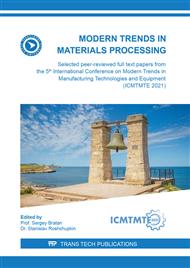p.253
p.259
p.265
p.271
p.278
p.284
p.290
p.296
p.302
Improving the Corrosion Resistance of Polished Stainless Steel Parts by Introducing the Energy of the Ultrasonic Field into the Forming Zone
Abstract:
This article presents the results of experimental studies of the effect of processing conditions on the corrosion resistance of polished parts made of stainless chromium-nickel steel of austenite class 12X18N10T. It is established that the introduction of the ultrasonic field energy into the shaping zone during grinding can increase the corrosion resistance of parts by 12-15 %, depending on the elements of the grinding mode. The latter is explained by a significantly lower heat-force stress during processing, which, in turn, leads to a decrease in the magnitude and depth of distribution of technological residual tensile stresses along the surface layer.
Info:
Periodical:
Pages:
278-283
DOI:
Citation:
Online since:
February 2022
Authors:
Price:
Сopyright:
© 2022 Trans Tech Publications Ltd. All Rights Reserved
Share:
Citation:


